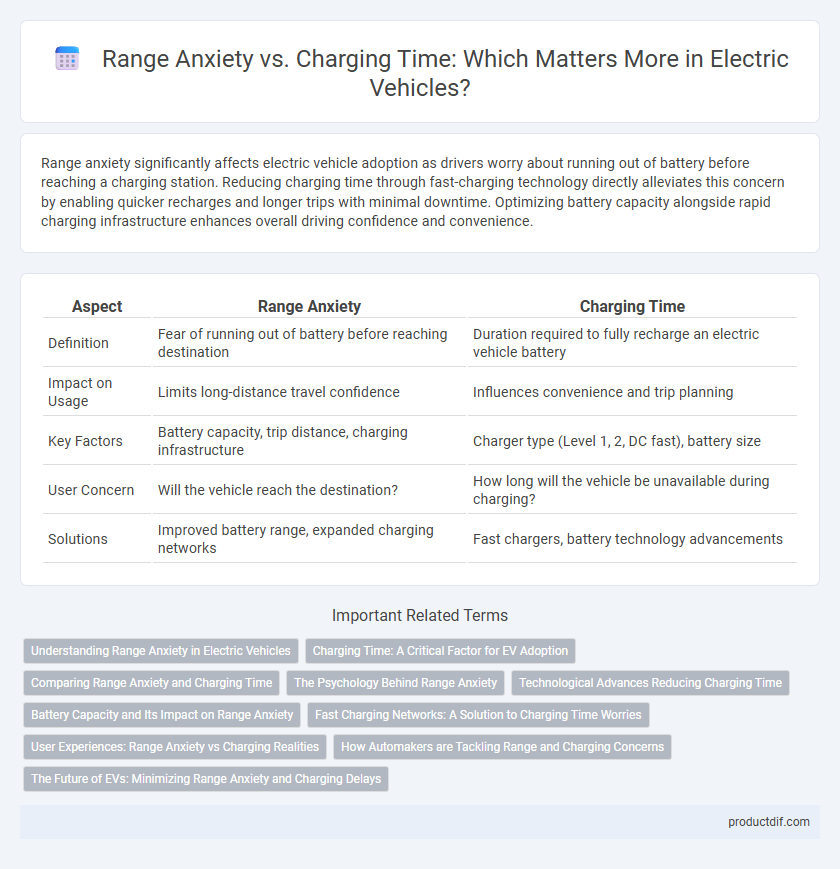Range anxiety significantly affects electric vehicle adoption as drivers worry about running out of battery before reaching a charging station. Reducing charging time through fast-charging technology directly alleviates this concern by enabling quicker recharges and longer trips with minimal downtime. Optimizing battery capacity alongside rapid charging infrastructure enhances overall driving confidence and convenience.
Table of Comparison
| Aspect | Range Anxiety | Charging Time |
|---|---|---|
| Definition | Fear of running out of battery before reaching destination | Duration required to fully recharge an electric vehicle battery |
| Impact on Usage | Limits long-distance travel confidence | Influences convenience and trip planning |
| Key Factors | Battery capacity, trip distance, charging infrastructure | Charger type (Level 1, 2, DC fast), battery size |
| User Concern | Will the vehicle reach the destination? | How long will the vehicle be unavailable during charging? |
| Solutions | Improved battery range, expanded charging networks | Fast chargers, battery technology advancements |
Understanding Range Anxiety in Electric Vehicles
Range anxiety in electric vehicles (EVs) stems from concerns about depleting battery charge before reaching a charging station or destination. Limited charging infrastructure and extended charging times compared to refueling internal combustion vehicles exacerbate this anxiety. Improving battery capacity and expanding fast-charging networks are critical to alleviating range anxiety and enhancing EV adoption.
Charging Time: A Critical Factor for EV Adoption
Charging time remains a critical factor influencing electric vehicle (EV) adoption, directly impacting user convenience and daily mobility patterns. Faster charging technologies, such as ultra-fast DC chargers capable of delivering 150 kW or more, significantly reduce downtime compared to standard Level 2 chargers that provide around 7 to 22 kW. Optimizing charging infrastructure to minimize wait times addresses consumer concerns and supports broader acceptance of EVs in urban and long-distance driving scenarios.
Comparing Range Anxiety and Charging Time
Range anxiety in electric vehicles often stems from limited driving distance per charge, while charging time directly impacts the convenience of longer trips. Faster charging technologies reduce wait times, alleviating range anxiety by enabling quicker battery replenishment. Efficient battery management and expanded fast-charging networks significantly improve driver confidence by balancing range concerns with minimized downtime.
The Psychology Behind Range Anxiety
Range anxiety in electric vehicle drivers stems from the psychological fear of depleting battery power before reaching a charging station, leading to stress and avoidance behavior. This phenomenon is influenced by perceived charging time, where longer waits intensify the uncertainty and reduce confidence in trip completion. Understanding this mental barrier is crucial for improving user experience and encouraging broader EV adoption through faster charging technologies and more widespread infrastructure.
Technological Advances Reducing Charging Time
Technological advances in fast-charging batteries and ultra-rapid charging stations have significantly reduced vehicle charging time, directly addressing range anxiety. Innovations such as solid-state batteries and improved thermal management systems enable electric vehicles to reach 80% charge within 15 to 30 minutes. These improvements not only enhance convenience but also increase electric vehicle adoption by providing faster, more reliable charging options.
Battery Capacity and Its Impact on Range Anxiety
Battery capacity directly influences range anxiety by determining how far an electric vehicle can travel on a single charge; larger capacity batteries extend driving range and reduce the frequency of recharging stops. High-capacity batteries often require longer charging times, which can increase user concerns about downtime during trips. Optimizing battery technology to balance capacity and fast-charging capabilities is essential to minimizing range anxiety and enhancing overall EV usability.
Fast Charging Networks: A Solution to Charging Time Worries
Fast charging networks significantly reduce vehicle charging time, alleviating range anxiety for electric vehicle (EV) drivers by enabling quick energy replenishment during trips. These networks, equipped with high-powered chargers delivering 150 kW or more, can recharge a typical EV battery to 80% capacity in 20 to 30 minutes. Widespread deployment of fast charging stations along highways and urban centers enhances convenience and confidence for EV users, promoting broader adoption of electric mobility.
User Experiences: Range Anxiety vs Charging Realities
Range anxiety often stems from misconceptions about EV battery capacity and charging infrastructure, with users fearing unexpected depletion of power during trips. In reality, fast-charging stations significantly reduce downtime, allowing most EVs to regain 80% charge within 30 minutes, improving long-distance travel confidence. User experience studies show that familiarity with charging locations and portable chargers effectively mitigates range anxiety, enhancing overall satisfaction with electric vehicle ownership.
How Automakers are Tackling Range and Charging Concerns
Automakers are investing heavily in advanced battery technologies to extend electric vehicle (EV) range beyond 300 miles per charge, reducing range anxiety for drivers. Fast-charging infrastructure is expanding with networks capable of delivering up to 250 kW, enabling EVs to recharge 80% of battery capacity in under 30 minutes. Innovative features such as intelligent energy management systems and predictive navigation assist drivers in optimizing routes and conserving battery life during long trips.
The Future of EVs: Minimizing Range Anxiety and Charging Delays
Advancements in battery technology and ultra-fast charging infrastructure are crucial for minimizing range anxiety and reducing charging time in electric vehicles (EVs). Innovations such as solid-state batteries promise higher energy density and faster recharge rates, enabling longer driving ranges with shorter stops. Expanding widespread, high-capacity charging networks coupled with smart grid integration will further enhance convenience and reliability for future EV adoption.
Range Anxiety vs Charging Time Infographic

 productdif.com
productdif.com